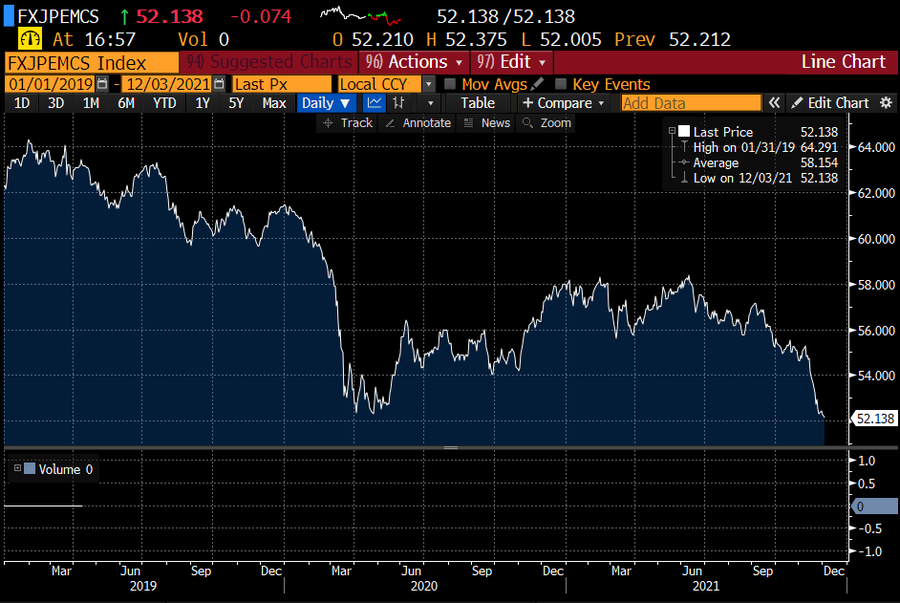Capital flows to emerging markets not including China suffered a “sudden stop” this quarter according to the Institute of International Finance, setting up some EMs poorly for an expected monetary tightening cycle in developed economies.
Emerging market stocks and currencies retreated on Friday in cautious trade ahead of key U.S. employment data, but were set for strong weekly gains on hopes that the impact of the Omicron coronavirus variant would be limited. The lira was set to lose about 9.7% this week, following the appointment of a new finance minister and President Tayyip Erdogan’s recommitment to keep interest rates low.
Ratings agency Fitch also downgraded Turkey’s outlook to “negative”, citing risks from the direction of monetary policy.
WATCH: Emerging Markets: The Dawn Of A Lost Decade | Real Turkey
EM on the verge of sudden stop (ex-China)
“Our high-frequency tracking shows flows into non-China EM grinding to a halt this quarter,” said IIF economists, with “important emerging markets” all but acting as closed economies over the past few years. “Emerging market flows have gone into a de facto sudden stop.”
Higher rate hike expectations have tracked the rise in inflation measures in developed economies, especially in the United States, forcing many emerging market central banks to tighten monetary policy.
The IIF analysis shows three of the largest EMs as the weakest in terms of inflows over the past three years to shield from the expected outflow of capital that would follow higher U.S. rates.
“Argentina, Brazil and Turkey are all in quasi financial autarky, with inflows in recent years near zero, as foreign investors steer clear of stocks and bonds in these countries,” the IIF said.
“This (inflation) is really increasing the pressure on Turkish authorities to do something. If they wait, give it two or three months, you would be looking at inflation between 25% to 30%,” said Jakob Christensen, chief analyst and head of emerging market research at Danske Bank.
TL struck by policy errors, low EM appetite
The IIF report said the large devaluation in the Turkish lira, down nearly 35% against the dollar so far this quarter, and down 46% year-to-date, “is likely to worsen the picture going forward, given that contagion to the rest of EM is possible.”
WATCH: How Bad is Fed Taper for Turkish Assets?
Argentina’s peso has fallen 17% this year in a controlled slide while Brazil’s real has fallen 8%.
“EM currencies are back to the lows of March 2020, the peak of the COVID sell-off when we were recording big EM outflows. This recovery – if you can call it that – is so different from 2008. Back then EM roared back, fueled by China’s huge infrastructure stimulus. Not this time…” commented IIF chief economist Robin Brooks in his Twitter account.
“2020 was an awful year for EM currencies and now 2021 looks even worse. The fall in Turkish Lira (TR) stands out, but many LatAm currencies have also taken a pounding, including Chile (CL), Colombia (CO) & Peru (PE). There’s no US taper tantrum, but EM is in a tantrum anyway…, he added in a second Tweet.
Follow our English language YouTube videos @ REAL TURKEY: https://www.youtube.com/channel/UCKpFJB4GFiNkhmpVZQ_d9Rg
And content at Twitter: @AtillaEng
